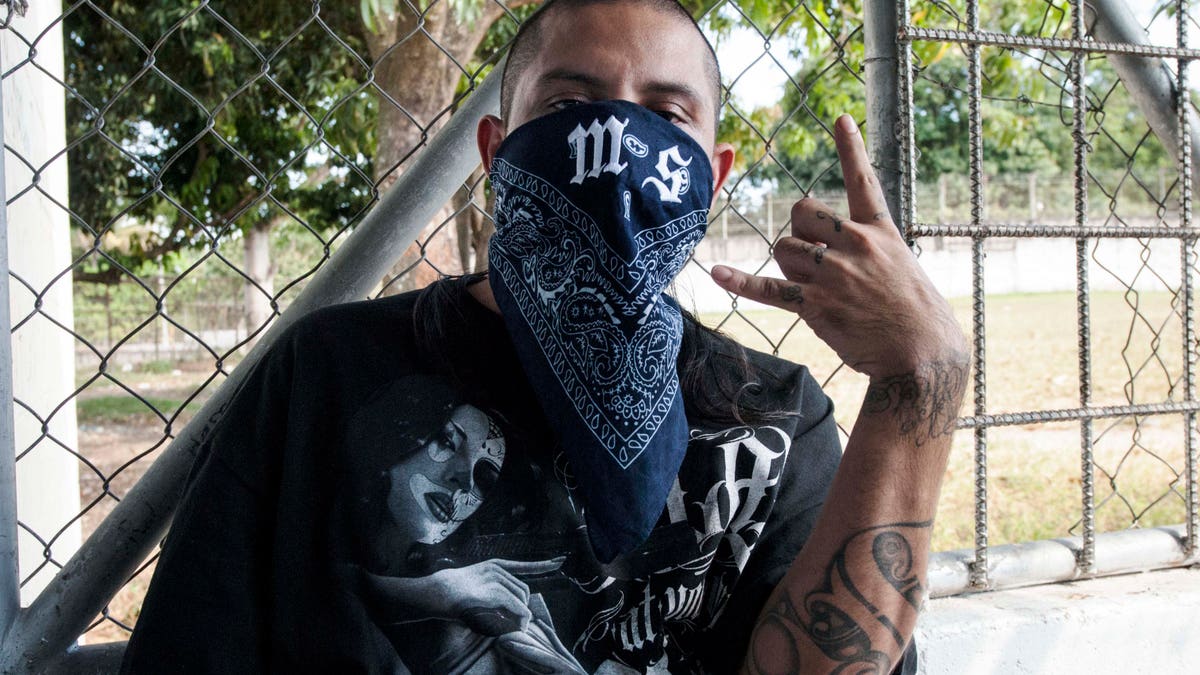
A Mara Salvatrucha gang member attends a press conference where leaders of the Mara Salvatrucha (MS-13) and Barrio 18 declared the city of Quezaltepeque a peace zone or "Sanctuary City" for gang related violence, on January 31, 2013 at the Quezaltepeque prison, 25 kms west of San Salvador. Gang leaders and members have been involved in a gang truce to reduce crime in El Salvador. AFP PHOTO/ Juan CARLOS (Photo credit should read Juan CARLOS/AFP/Getty Images) (2013 AFP)
The Salvadoran government is refusing to acknowledge that the country's rampant levels of gang violence is a major reason why thousands of people are fleeing the country to seek shelter in neighboring nations and in the United States, a new report from a human rights' organization stated.
Due to the endemic levels of violence in El Salvador, Refugees International wants the country's government to develop a humanitarian strategy to address the needs of those displaced by gang violence and is also asking the country's neighbors to grant safe haven to Salvadorans until they can safely return home.
"While the government focuses its attention on trying to combat the gangs, very little attention is being paid to the gangs' victims," Sarnata Reynolds, Refugee International's Senior Advisor on Human Rights said in a press release. "With no official government programs in place to help them internally, the only option for many is to flee to other countries."
In June, El Salvador experienced more murder in any month since the end of the country's decade-plus long civil war in 1992.
Police officials and others blame the worsening insecurity on the breakdown of a truce made between the gangs and the government in 2013. While the homicide rate plunged, critics say the truce gave the gangs time to strengthen, train and acquire heavier arms than they had in the past.
Jailed gang leaders were moved from maximum-security prisons to more lax facilities where they were able to run their criminal operations remotely.
But in January, the 6-month-old government of President Salvador Sánchez Cerén publicly rejected any truce and launched an aggressive crackdown, putting gang leaders back in maximum-security cells. The change has meant the streets now are controlled by younger, better-armed criminals who are willing to be reckless.
"You take away the mature leadership, and you get a structure that is made up of younger, fanatical people who want to make a name for themselves," said Raul Mijango, a former guerrilla and a facilitator of the truce. "They want war."
The police say they are ready for battle.
"Things have to get worse before they get better," said a police official, who agreed to comment only if not quoted by name for fear of reprisals. "When I see one (gang member) on the street, I'm going to shoot him before he shoots me."
Police say the crackdown on gang strongholds in the cities has caused members to flee to surrounding rural areas, bringing violence with them.
"It's critical that regional countries keep their borders open to those seeking protection," Reynolds said. "Those who flee have a right to request and receive protection when they have fled a credible risk of torture or persecution. It's unconscionable that they would be returned to a country where their lives are at serious risk."
The Associated Press contributed to this report.







































